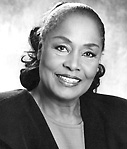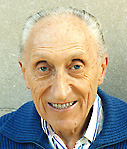Shirley Verrett
Shirley Verrett, the James Earl Jones Distinguished University Professor of Voice at the School of Music, Theatre & Dance, died Nov. 5 in Ann Arbor at the age of 79.
“She was one of America’s greatest opera singers,” George Shirley, professor emeritus of voice and longtime friend and colleague, told the Detroit Free Press. “She had a tremendous impact artistically and as a person, and in recent years she was a wonderful teacher and mentor for students.”

Verritt. Photo courtesy School of Music, Theatre & Dance.
Described by the New York Times as a “vocally lustrous and dramatically compelling American opera singer with a plush, rich and powerful voice, thorough musicianship, insightful dramatic skills, charisma and beauty,” Verrett performed more than 40 roles, both in the United States and abroad, over the course of her career.
She made opera history in 1973, singing both Dido and Cassandra in Berlioz’s “Les Troyens” at the opening night of the Metropolitan Opera’s production, stepping in at the last minute for an ailing colleague. Known for a unique and varied repertoire, her mastery of a wide range of vocal literature earned her a unique place in opera lore. She was embraced by audiences in Italy after a triumphant performance at La Scala as Lady Macbeth in Verdi’s opera. She was equally beloved at the Paris Opera, where she starred in a series of operas staged especially for her and later appeared at the opening of the Bastille Opera in a widely hailed production of “Les Troyens.”
Verrett joined the faculty of the School of Music, Theatre & Dance in 1996, recruited by George Shirley. “I had always planned to go into acting, drama,” she told Music @ Michigan in 2003. “I love words. … I didn’t think I’d like to teach, at all, but I found quite the opposite — that I truly enjoy it.”
“Young people need to be patient,” she said. “Most singers are in too much of a hurry. They want it all now. First they need to do the work, diligently; study well. If it’s going to be, it will be.”
Always an elegant presence around the school, Verrett mentored students both in vocal skills and professionalism. A term was even coined to describe the transformative experience of time well spent in her studio: you became “Verretticized.”
“The allure of a singing career can be intoxicating,” she said. “All those bravas — brava brava brava — it’s marvelous. But it disappears. And your family does not. Your family wants you to do well, but if you don’t, they will still love you.”
Verrett is survived by her husband of 47 years, Lou LoMonaco, and their daughter Francesca. She wrote with candor about the highs and lows of an opera career in her 2003 autobiography “I Never Walked Alone.”
Lydia Qiu, collaborative pianist who worked with Verrett and tells us that she always brought flowers to her students and their accompanists for each recital, says, “She will be sadly missed as a wonderful artist, a caring mentor and a gentle soul.”
Plans are underway for a musical celebration of her life at a later date.
— Submitted by Betsy Goolian, School of Music, Theatre & Dance
Fred Hendel
Alfred (Fred) Hendel, professor emeritus of physics, died at his home Oct. 7, 12 days before his 94th birthday.
Hendel was born Oct. 19, 1916, in Vienna, Austria. He was a student at the University of Vienna at the time of the Anschluss when Austria was taken over by Nazi Germany. Hendel was, for a short time, involved with the underground, but he was forced to escape from Austria in 1938, also helping others to leave. He went to Bolivia where he spent the next 17 years.

Hendelt. Photo by Jen Zorns
At first, he earned his living in many ways — as an electrician, a newspaper photographer, a croupier in a casino and a teacher of Spanish. In 1945 he joined the physics faculty of the University of La Paz. He was given a half-time appointment in 1952 as an associate professor in the Centro Brasileiro de Pesquisas Fisicas in Brasil, which he fulfilled at the Mount Chacaltaya cosmic ray research station, at an elevation of about 5,200 meters above sea level, near La Paz, Bolivia.
Hendel loved skiing and helped to build a ski lodge and the first ski lift in South America on Mount Chacaltaya. In 1954 he went to France, where he attended the Sorbonne and from which he received his doctorate in physics in 1956. His research with French colleagues involved the study of recently discovered cosmic ray-produced mesons in cloud chambers at the Pic du Midi in the French Pyrenees.
He accepted a cosmic ray physics research position at Princeton University in 1957, and subsequently was recruited by Professor Wayne Hazen to join the faculty of the Department of Physics at U-M in 1959. He thoroughly enjoyed teaching and his interactions with students, colleagues say. He was involved with the Keller self-paced format in teaching the introductory physics course, writing much of the material for this alternative to the traditional lecture/discussion-section format, which was an early step in the evolution of introductory physics teaching at Michigan. With Hazen, he continued his cosmic ray research in Bolivia, where he spent about four months each year; together they made significant advances in the studies of radio signals in the 10-100 MHz frequency range produced by extensive air showers of cosmic rays at the Mount Chacaltaya research station.
Hendel continued mountain climbing ventures on the Bolivian Andes; in 1963, he and Paul Barker (a former student of Hazen) were the first climbers to ascend the south ridge of Mount Huayna Potosi (6,008 meters) and, in 1967, they were the first to ascend the north ridge of Mount Illimani (6,438 meters).
He retired from U-M faculty in 1986. In his retirement, he wrote two books: “Mountains in Bolivia” and “Revolutions in Bolivia,” in which he described some of his experiences. He was a man of many interests, from mountain climbing and skiing to playing bridge and chess. Hendel loved life; he had a great sense of humor and enjoyed a good time, colleagues say. He was skilled at solving difficult problems with simple solutions and was always ready to help others, they say.
Hendel is survived by his wife of 43 years, Florence; nephew George; niece Noemi; and grandchildren.
— Submitted by Larry Jones and Bill Ford, Department of Physics

